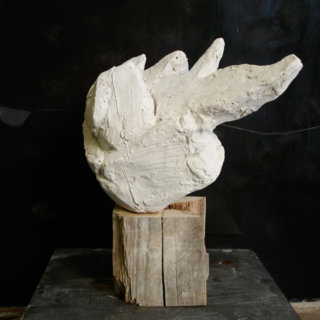Making a plaster cast from a clay model
In this technically oriented course the basics of modelling and simple plaster casting will be taught. Getting to know the materials, and meaningful ways of working, will be the main focus.

In this technically oriented course the basics of modelling and simple plaster casting will be taught. Getting to know the materials, and meaningful ways of working, will be the main focus.

The most varied inspirations can lead to the creation of a work of art. During this week we will open ourselves to new experiences in forming and shaping.

Plaster is indispensable in sculpture. Its countless processing options make it a unique material for artistic creation. Plaster can be built up just as easily as it can be removed. You can cast it, drip it, spread it on, chisel, saw, drill, rasp, or sand it. Depending on the setting stage during modeling, various surface structures can emerge: everything from smooth, taut surfaces to rough, fragmented forms is possible. Art history is full of wonderful examples, as seen in works by Giacometti, Henry Moore, and Hans Arp.

This course focuses on experimenting, playing, and exploring the vast possibilities of form in sculpture. We will mainly work with plaster and clay—two ideal materials provided by nature. We’ll also incorporate pigments, stones, and plant fibers. We joyfully allow nature and chance to play a role in our search for form. Failed attempts will be recycled or returned to nature.

Concrete is characterized by its strength, durability, and versatility. Thanks to its plastic properties, it allows for the creation of complex shapes and spatial structures.

This one-week course offers the possibility of modeling a figure from a live model and to subsequently cast it in plaster. Thus two learning themes are combined: firstly, the figurative design focussing on the anatomy and secondly the casting technique of the ‘lost form’ in plaster. This week’s course is aimed at course participants who are experienced as well as inexperienced in the field of figurative design.
In order for this website to function properly and to improve your experience, we use cookies. For more information, see our cookie policy.
Necessary cookies enable the core functionality. The website cannot function properly without these cookies and can only be deactivated by changing your browser settings.